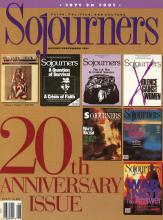As is well known to readers of these pages, Hollywood cinema in the Reagan era was largely devoted to the glorification of wealth, power, destruction, and conformity. Women were relegated to the sidelines ("Please don't go out there!" said the scaredy-cat wife/girlfriend to the brave sheriff/soldier/spaceman/whatever) or to the ever-popular bedroom. If a woman achieved a position of any importance it was because she was, beneath it all, a real girl and not a cold, bitchy (read "feminist") woman (see Working Girl by ex-liberal Mike Nichols or the era-ending, cradle-robbing Pretty Woman).
But after a decade in which women were systematically abused, exploited, or, perhaps worse, infantilized, 1991 has seen no less than four (count 'em four) major Hollywood productions -- with stars and everything -- in which women stand up and fight back against violent, abusive, and sexist men. In case you've been napping, the four (by my count) are Sleeping With the Enemy (Julia Roberts), Mortal Thoughts (Demi Moore), The Silence of the Lambs (Jody Foster), and Thelma and Louise (Susan Sarandon and Geena Davis).
Sleeping With the Enemy is by far the weakest of the four. The first half (when Julia Roberts suffers under, then escapes from, her upper-class brute of a husband) works well enough. The husband's sexual violence is a logical extension of his general rage for order, hierarchy, and hygiene (all the good neo-fascist virtues). Roberts' silent scheming against him is believable and suspenseful. But the filmmakers seem to have not a clue what to do with the woman once she is free. So the movie falls back on Hitchcockian camera tricks and set pieces of Julia Roberts being beautiful (and in love again), all to a Motown soundtrack. Then the final cop-out, when the monster returns, another man has to come to the rescue.
Read the Full Article
